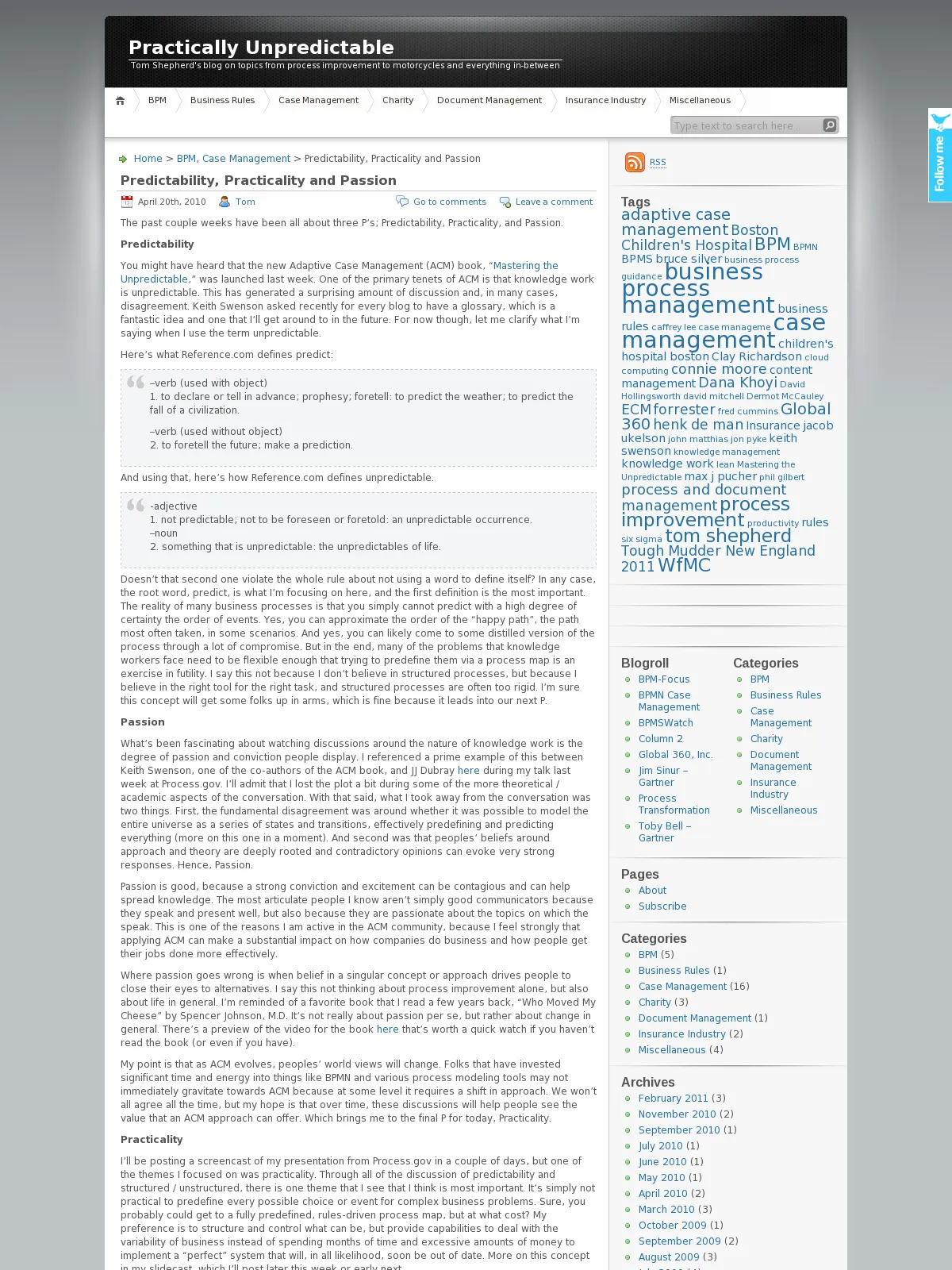Predictability, Practicality and Passion
The past couple weeks have been all about three P’s; Predictability, Practicality, and Passion.
- Predictability
You might have heard that the new Adaptive Case Management (ACM) book, “Mastering the Unpredictable,” was launched last week. One of the primary tenets of ACM is that knowledge work is unpredictable. This has generated a surprising amount of discussion and, in many cases, disagreement. Keith Swenson asked recently for every blog to have a glossary, which is a fantastic idea and one that I’ll get around to in the future. For now though, let me clarify what I’m saying when I use the term unpredictable.
Here’s what Reference.com defines predict:
–verb (used with object)
1. to declare or tell in advance; prophesy; foretell: to predict the weather; to predict the fall of a civilization.–verb (used without object)
2. to foretell the future; make a prediction.
And using that, here’s how Reference.com defines unpredictable.
-adjective
1. not predictable; not to be foreseen or foretold: an unpredictable occurrence.
–noun
2. something that is unpredictable: the unpredictables of life.
Doesn’t that second one violate the whole rule about not using a word to define itself? In any case, the root word, predict, is what I’m focusing on here, and the first definition is the most important. The reality of many business processes is that you simply cannot predict with a high degree of certainty the order of events. Yes, you can approximate the order of the “happy path”, the path most often taken, in some scenarios. And yes, you can likely come to some distilled version of the process through a lot of compromise. But in the end, many of the problems that knowledge workers face need to be flexible enough that trying to predefine them via a process map is an exercise in futility. I say this not because I don’t believe in structured processes, but because I believe in the right tool for the right task, and structured processes are often too rigid. I’m sure this concept will get some folks up in arms, which is fine because it leads into our next P.
- Passion
What’s been fascinating about watching discussions around the nature of knowledge work is the degree of passion and conviction people display. I referenced a prime example of this between Keith Swenson, one of the co-authors of the ACM book, and JJ Dubray here during my talk last week at Process.gov. I’ll admit that I lost the plot a bit during some of the more theoretical / academic aspects of the conversation. With that said, what I took away from the conversation was two things. First, the fundamental disagreement was around whether it was possible to model the entire universe as a series of states and transitions, effectively predefining and predicting everything (more on this one in a moment). And second was that peoples’ beliefs around approach and theory are deeply rooted and contradictory opinions can evoke very strong responses. Hence, Passion.
Passion is good, because a strong conviction and excitement can be contagious and can help spread knowledge. The most articulate people I know aren’t simply good communicators because they speak and present well, but also because they are passionate about the topics on which the speak. This is one of the reasons I am active in the ACM community, because I feel strongly that applying ACM can make a substantial impact on how companies do business and how people get their jobs done more effectively.
Where passion goes wrong is when belief in a singular concept or approach drives people to close their eyes to alternatives. I say this not thinking about process improvement alone, but also about life in general. I’m reminded of a favorite book that I read a few years back, “Who Moved My Cheese” by Spencer Johnson, M.D. It’s not really about passion per se, but rather about change in general. There’s a preview of the video for the book here that’s worth a quick watch if you haven’t read the book (or even if you have).
My point is that as ACM evolves, peoples’ world views will change. Folks that have invested significant time and energy into things like BPMN and various process modeling tools may not immediately gravitate towards ACM because at some level it requires a shift in approach. We won’t all agree all the time, but my hope is that over time, these discussions will help people see the value that an ACM approach can offer. Which brings me to the final P for today, Practicality.
- Practicality
I’ll be posting a screencast of my presentation from Process.gov in a couple of days, but one of the themes I focused on was practicality. Through all of the discussion of predictability and structured / unstructured, there is one theme that I see that I think is most important. It’s simply not practical to predefine every possible choice or event for complex business problems. Sure, you probably could get to a fully predefined, rules-driven process map, but at what cost? My preference is to structure and control what can be, but provide capabilities to deal with the variability of business instead of spending months of time and excessive amounts of money to implement a “perfect” system that will, in all likelihood, soon be out of date. More on this concept in my slidecast, which I’ll post later this week or early next.
So, with that, thoughts? Comments? Criticisms? Suggestions or experiences?
